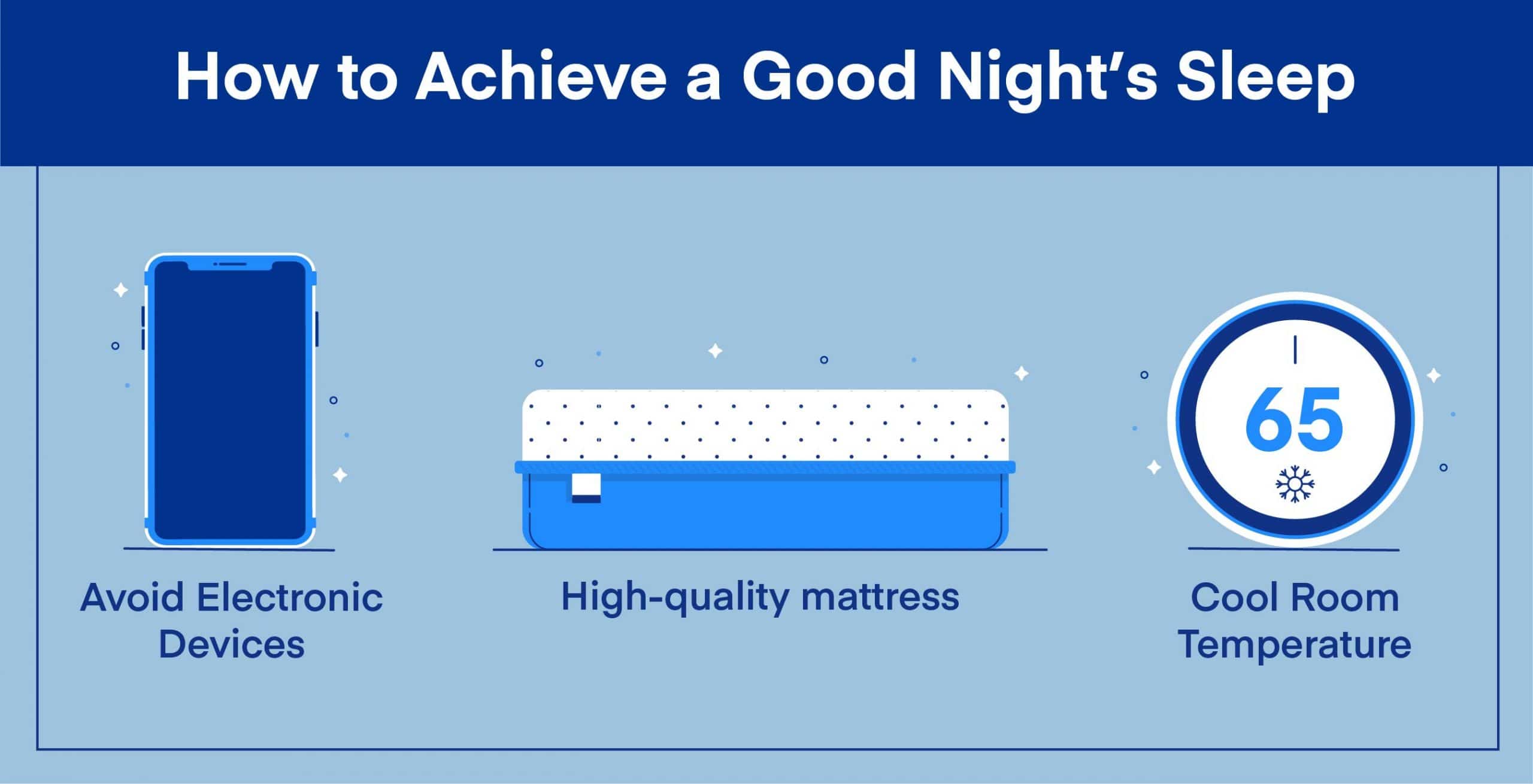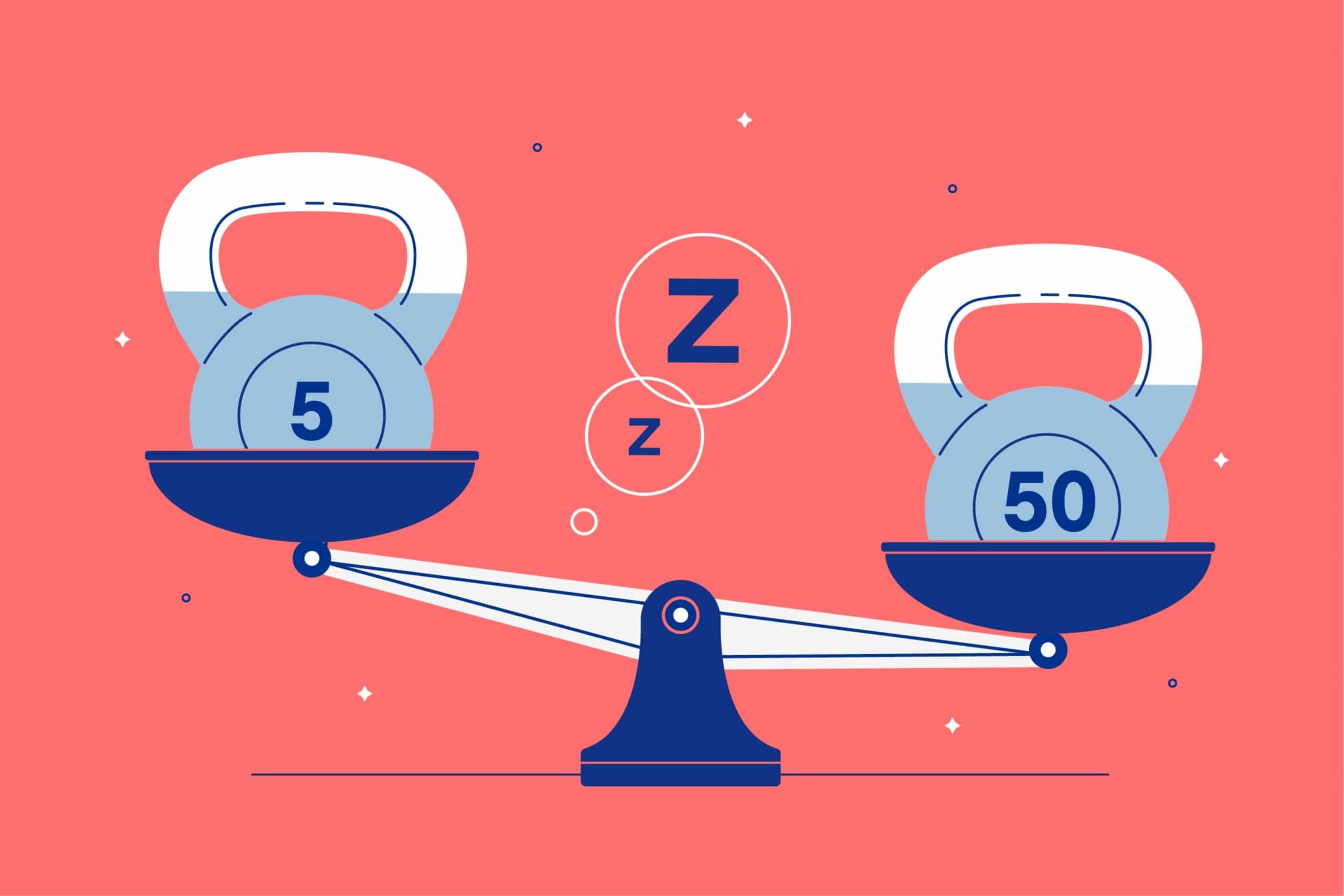Some people wake to something as simple as their partner’s foot gliding across the bed, while others could peacefully sleep through a hurricane. Why is this?
Undiagnosed sleep disorders, lifestyle choices, genetics, hormonal imbalance, and varying levels of brain activity are potential causes for extreme differences in sleep sensitivity. Still, specialists know little about why some people sleep light while others rest deep and heavy. The mysterious cause is a popular conversation, and although we may humorously discuss our sleeping sensitivities, light sleepers are frequently frustrated by inadequate sleep.
In this article, we will discuss the differences between light and heavy sleepers and provide advice to light sleepers yearning for quality rest.
Different Sleep Stages
We cycle through two main stages of sleep throughout the night: non-rapid eye movement (NREM) and rapid eye movement (REM). REM is the stage of dream development while NREM provides deeper sleep. We spend significantly less time in REM sleep because there are four cycles of NREM our body must alternate through to reach it. Here’s how it works.
- Stage One (NREM sleep): This stage is the shortest, lasting only a few minutes. It occurs when we are between a state of consciousness and sleep. Our breathing, heart rate, brain wave activity, and eye movement slightly slow while muscles relax.
- Stage Two (NREM sleep): The second stage of sleep lasts approximately 30 to 60 minutes. During this time, our breathing, heart rate, and brain wave activity progressively slow, eye movement ceases, and our muscles relax further.
- Stage Three/Four (NREM sleep): Our breathing, heart rate, and brain wave activity reach their lowest point during these deep and restorative stages of sleep. Stages three and four are crucial to our everyday health because our body heals itself during this time. In fact, young people still developing spend a longer amount of time in the last NREM stages. The first cycle of deep sleep lasts 45 to 90 minutes but subsequently shortens.
- Stage Five (REM sleep): After you’ve left the restorative phase, your breathing, heart rate, and blood pressure increase and your eyes begin rapidly shifting from side to side. Your brain wave activity intensifies as well, mimicking similar patterns as when you’re awake, perhaps the reason most dreams occur during this time. This stage typically lasts 10 minutes and only accounts for 25 percent of your slumber.
Once the stages are complete, your body begins the cycle again, repeating it four to five more times. However, deep sleep is not always attainable. Light sleepers may remain in stage one or two a majority of the night, attempting but never experiencing restorative sleep. On the other hand, deep sleepers may spend a prolonged amount of time in stages three and four.
How Are Light Sleepers and Heavy Sleepers Different?
Light sleepers are easily disturbed by external stimuli, such as light, smell, and noise, while heavy sleepers are not. However, the amount of time spent in each sleep stage is not fully responsible for these varying levels of sensitivity.
A recent sleep study found sleep spindles (a type of brainwave) also affect our ability to remain asleep when exposed to external stimuli. The researchers used an EEG to track the presence of sleep spindles in twelve sleepers. They found the more sleep spindles a person produced, the less likely abrupt changes in light, noise, or smell woke them. Although high-frequency sleep spindles effectively block out disrupting changes to our sleep environment, doctors are yet to find a way to increase them.
The researchers also found sleep spindles were especially active during the second sleep stage, right before reaching deep sleep. This may be the reason light sleepers struggle to obtain restorative rest.
Fortunately, light sleepers can take additional measures to enhance the quality of their sleep.
How to Achieve a Good Night’s Sleep

- Establish a sleep schedule. Waking up and going to bed at the same time every day will maintain your body’s internal clock or circadian rhythm. Circadian rhythm is a 24-hour biological process that controls the sleep-wake cycle. If you rise and rest at the same time every day, your circadian rhythm will quickly adapt to promote wakefulness and sleepiness at an appropriate time. When establishing your sleep schedule, be sure to allocate at least 30 minutes to fall asleep.
- Create a bedtime routine. Completing stressful activities, such as working before bed, may cause nighttime anxiety and frequent wake time. Prevent tossing and turning by creating a routine you can associate with rest. This may look like reading a book, bathing, or journaling.
- Maintain a comfortable room temperature. Decreases in body temperature lead to sleepiness while increases in temperature promote alertness. This process is called thermoregulation and is a part of our circadian rhythm or internal body clock. Before falling asleep, your body temperature needs to drop. However, if your room is too hot, your body may struggle to cool off and thus, rest. Sleep specialists recommend keeping your room temperature at 60 to 67 degrees to promote thermoregulation and help you fall asleep quickly.
- Keep electronic devices out of your bedroom. Blue light radiates from televisions, computers, and phone screens. Blue wavelengths are useful during the day because they enhance alertness, mood, and reaction time. However, they are harmful at night. Research by Harvard Medical School Verified Source Harvard Health Blog run by Harvard Medical School offering in-depth guides to better health and articles on medical breakthroughs. View source shows blue light powerfully suppresses melatonin production—a hormone that regulates the sleep-wake cycle.
- Block out external stimuli. Blackout curtains or eye masks can shut out disrupting light while noise mufflers will suppress any loud noises.
- Evaluate the quality of your mattress. If you constantly wake from discomfort, it may be time to invest in a higher-quality mattress. An unsupportive mattress unfit to meet the needs of your unique body type and sleeping position can cause frequent tossing and turning from body pain and result in poor quality sleep.
FAQ
Is being a heavy sleeper bad?
Being a heavy sleeper is not bad. If you sleep for seven hours a night and identify as a deep sleeper, the only foreseeable drawbacks are sleeping through things you probably shouldn’t, such as an alarm. Otherwise, receiving a good night’s sleep on a regular basis can preserve your overall health by improving immune function, memory, and learning ability.
Is snoring a sign of deep sleep?
While you may find it surprising that your sleep partner’s own snoring doesn’t wake them up, snoring is not always a sign of deep sleep. Snoring is typically the result of a blocked nasal passage which can arise from bedroom allergens, a common cold, dry climates, or unhealthy sleeping positions. Along with insomnia and excessive daytime sleepiness, snoring can also be a symptom of sleep apnea—a sleep disorder causing breathing to repeatedly stop and start throughout the night.
How many hours of sleep should I get?
According to the Centers for Disease Control and Prevention Verified Source Centers for Disease Control and Prevention (CDC), The United States’ health protection agency that defends against dangers to health and safety. View source adults need 7 hours of sleep or more. However, the amount of time you rest does not always determine whether or not you got enough sleep. Heavy sleepers may sleep a significantly shorter amount of time than light sleepers, but wake feeling better rested. This is because they spent enough time alternating through the deep sleep stages while the light sleeper did not.
Should I take melatonin if I can’t sleep?
Our body naturally produces melatonin before sleep, so unless your doctor has suggested melatonin supplements, we suggest avoiding them. Too much melatonin can actually reduce the time and quality of your sleep. It also carries adverse effects like headaches, nausea, joint pain, anxiety, mild tremors, and depression.
Should I see a doctor if I’m a light sleeper?
Follow our above advice on how to achieve a good night’s sleep before reaching out to your doctor. If your sleeping patterns continue resulting in daytime sleepiness or nighttime anxiety, consider reaching out to a sleep specialist. They will find the root cause of your light sleeping by conducting a series of sleep studies and other tests to create an individualized plan for you.
Conclusion
Changes in schedule, our jobs, stress, environmental factors, and even the food we eat alter our sleep sensitivity. If you find yourself sleeping light, improve your rest by practicing good sleep hygiene. This will consist of making your sleeping environment darker, colder, and quieter. You can also establish a bedtime routine you identify with calmness, such as reading or taking a relaxing bath. Sticking to specific sleep-and-wake times will help as well.
However, if you’re light sleeping results in sickness, anxiety, depression, or the inability to fulfill your daily responsibilities, the assistance of a medical professional may benefit you. Regardless of your route to better rest, we encourage you to prioritize it because the quality of your days stems from the quality of your sleep.
About the author
McKenzie Hyde is a Certified Sleep Science Coach and a full-time writer specializing in sleep health and the mattress industry. With a Master of Arts degree in literature and writing from Utah State University, McKenzie combines her passion for writing with her in-depth knowledge of sleep science. Her articles cover a wide range of topics, including best sleep practices for students, the consequences of sleep deprivation, and choosing the right mattress for back pain relief. McKenzie's dedication to delivering accurate and informative content makes her a valuable contributor to the field of sleep health.
View all posts




